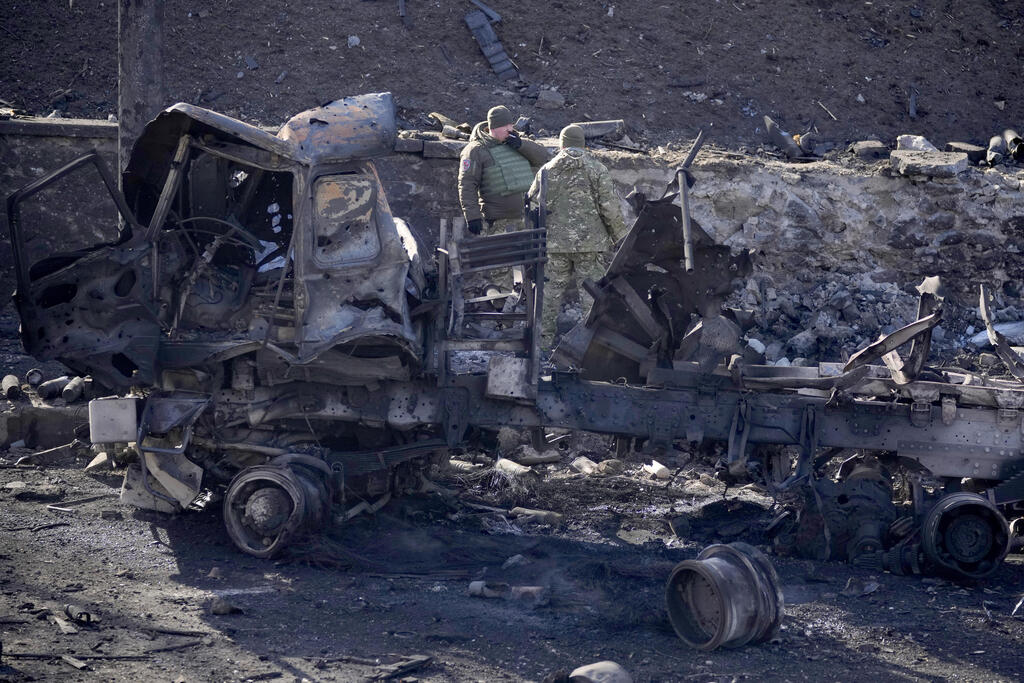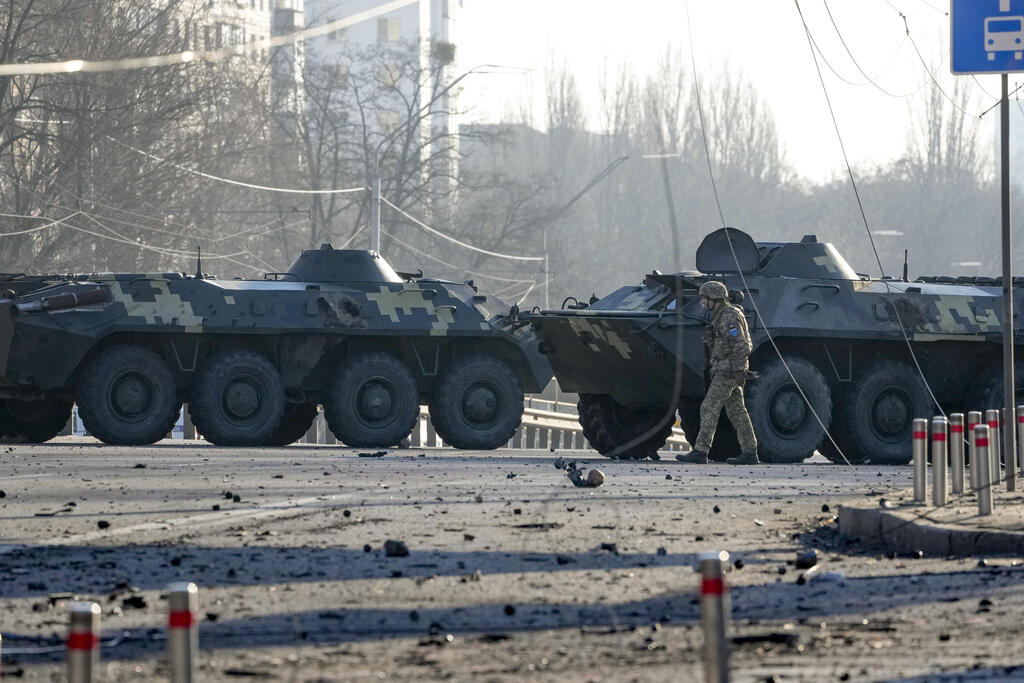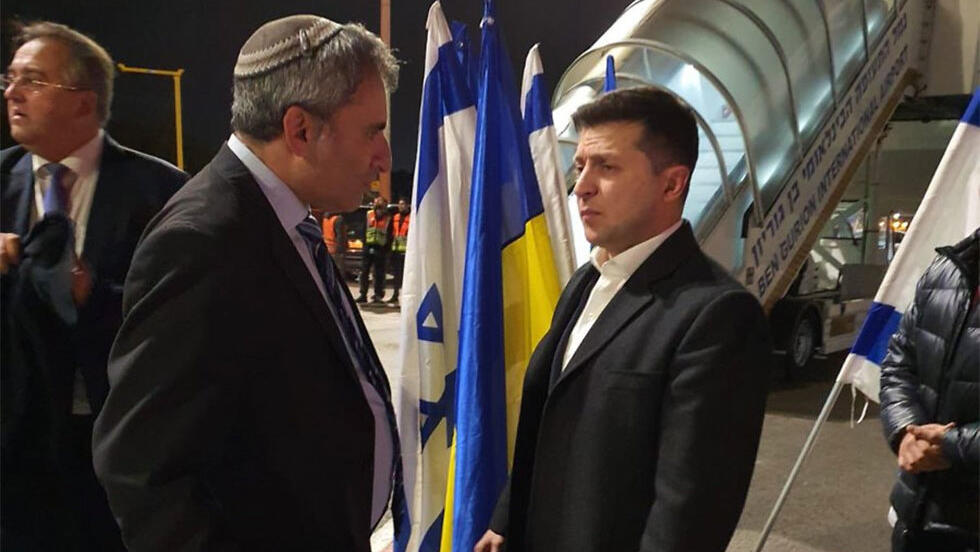Vladimir Putin told the world in the lead-up to Thursday’s attacks on Ukraine that his operation aims to “denazify” Ukraine, a country with a Jewish president who lost relatives in the Holocaust and who heads a Western-backed, democratically elected government.
The Holocaust, World War II and Nazism have been important tools for Putin in his bid to legitimize Russia’s moves in Ukraine, but historians see their use as disinformation and a cynical ploy to further the Russian leader’s aims.
Israel has proceeded cautiously, seeking not to jeopardize its security ties with the Kremlin, despite what it considers the sacred memory of the 6 million Jews who were murdered by the Nazis in the Holocaust.
Here’s a closer look at how the ghosts of the past are shaping today’s conflict:
The war that defines Russia
World War II, in which the Soviet Union lost an estimated 27 million people, is a linchpin of Russia’s national identity. In today’s Russia, officials bristle at any questioning of the USSR’s role.
In Ukraine, Russia has tried to link the country to Nazism, particularly those who have led it since a pro-Russian leadership was toppled in 2014.
This goes back to 1941 when Ukraine, at the time part of the Soviet Union, was occupied by Nazi Germany. Some Ukrainian nationalists welcomed the Nazi occupiers, in part as a way to challenge their Soviet opponents, according to Yad Vashem, Israel’s Holocaust memorial. Historians say that, like in other countries, there was also collaboration.
5 View gallery
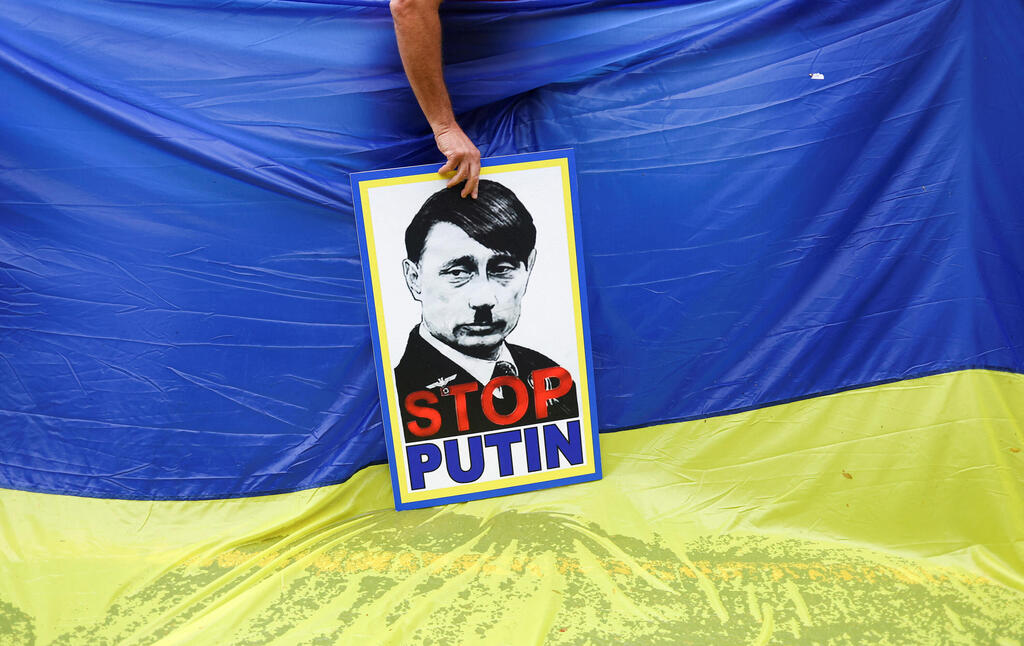

A banner in a protest against Russian President Vladimir Putin in South Africa
(Photo: Reuters)
Some of Ukraine’s politicians since 2014 have sought to glorify nationalist fighters from the era, focusing on their opposition to Soviet rule rather than their collaboration and documented crimes against Jews, as well as Poles living in Ukraine.
But making the leap from that to claiming Ukraine’s current government is a Nazi state does not reflect the reality of its politics, including the landslide election of a Jewish president and the aim of many Ukrainians to strengthen the country’s democracy, reduce corruption and move closer to the West.
“In terms of all of the sort of constituent parts of Nazism, none of that is in play in Ukraine. Territorial ambitions. State-sponsored terrorism. Rampant antisemitism. Bigotry. A dictatorship. None of those are in play. So this is just total fiction,” said Jonathan Dekel-Chen, a history professor at Jerusalem’s Hebrew University.
What’s more, Ukrainian President Volodymyr Zelensky is Jewish and has said that three of his grandfather’s brothers were killed by German occupiers while his grandfather survived the war. That hasn’t stopped Russian officials from comparing Zelensky to Jews who were forced to collaborate with the Nazis during the Holocaust.
Holocaust distortion
Putin’s attempts to stretch history for political motives is part of a trend seen in other countries as well. Most prominently is Poland, where authorities are advancing a nationalist narrative at odds with mainstream scholarship, including through a 2018 law that regulates Holocaust speech.
The legislation sought to fight back against claims that Poland, a victim of Nazi Germany, bore responsibility for the Holocaust. The law angered Israel, where many felt it was an attempt to whitewash the fact that some Poles did kill Jews during the German occupation during World War II. Yad Vashem also came out against the legislation.
Havi Dreifuss, a historian at Tel Aviv University and Yad Vashem, said the world was now dealing with both Holocaust denial and Holocaust distortion, where countries or institutions were bringing forth their own interpretations of history that were damaging to the commemoration of the Holocaust.
“Whoever deals with the period of the Holocaust must first and foremost be committed to the complex reality that occurred then and not with wars over memory that exist today,” she said.
Israeli interests
The Holocaust is central to Israel’s national identity. The country comes to a two-minute standstill on its Holocaust remembrance day. Schoolchildren, trade groups and soldiers make regular trips to Yad Vashem’s museum. Stories of the last cohort of Holocaust survivors constantly make the news.
Israel has butted heads with certain countries, like Poland, over the memory of the Holocaust. But Israel has appeared more reticent to challenge Putin and his narrative, according to some observers, because of its current security interests. Israel relies on coordination with Russia to allow it to strike targets in Syria, which it says are often weapons caches destined for Israel’s enemies.
Israel came under fire from historians in 2020 after a speech by Putin and a separate video presentation at a meeting of world leaders in Jerusalem to commemorate the liberation of the Auschwitz-Birkenau death camp, which they said skewed toward his narrative and away from the historical facts.
5 View gallery
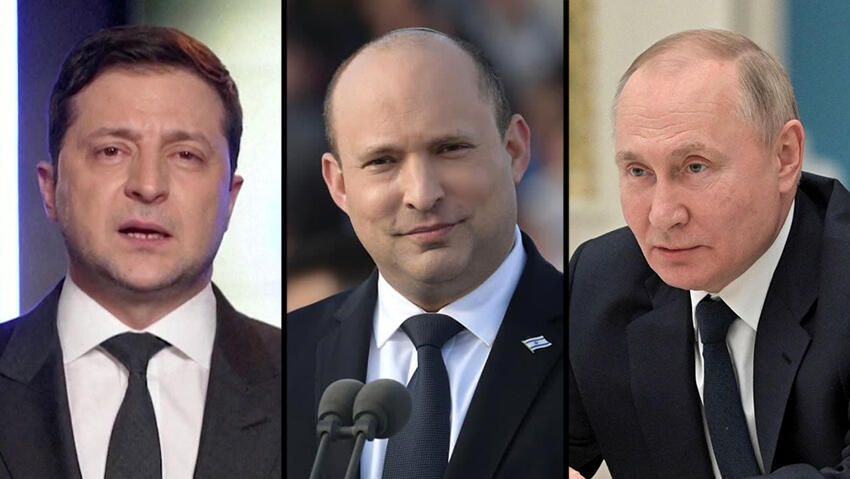

Ukrainian President Volodymyr Zelensky, Prime Minister Naftali Bennett, Russian President Vladimir Putin
(Photo: AFP, GPO, Reuters)
Israel was conspicuously muted in its criticism of Russia in the lead-up to the attacks on Ukraine. Commentator Raviv Drucker wrote in the daily Haaretz that Israel was “on the wrong side of history” with its response, which initially sought to support Ukraine while not rattling Russia.
On Thursday, Foreign Minister Yair Lapid condemned Russia’s attacks as “a grave violation of the international order.” But Prime Minister Naftali Bennett stopped short of issuing a public condemnation of Russia’s attack.
Vera Michlin-Shapir, a former official at National Security Council and the author of “Fluid Russia,” a book about the country’s national identity, said that Israel’s regional security concerns were of greater interest than challenging Russia on its narrative.
“Russia can provide weapons systems to our worst enemies and therefore Israel is proceeding very cautiously — you could say too cautiously — because there is an issue here that is at the heart of Israel’s security,” she said.


